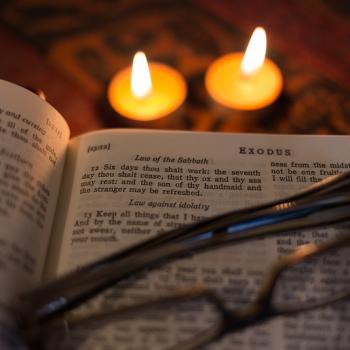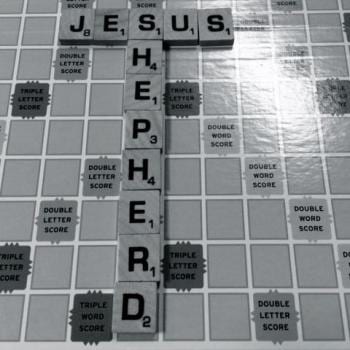
In their song “I’m Free,” The Rolling Stones put it succinctly: “I’m free to do what I want any old time.”
In other words, as long as I’m not hurting anyone or breaking the law I can do what I want. Isn’t that what the serpent said to Adam and Eve? “You won’t die! And is that what God really said anyway?” And on down through history we perpetuate this ideology of doing whatever we want whenever we want.
It’s that easy isn’t it? If I want to do something I can somehow spiritualize it or I can play the freedom card. Even in the church, we justify and excuse away doing things that contradict God’s expectations for us. But the reality is that this sort of ideology is not biblical.
Against the Nom?
The early church actually had to deal with this exact problem. In his second epistle, Peter calls out false teachers who are seemingly proclaiming this exact thing. The scholarly term for what Peter is denying is called antinomianism. The word antinomianism comes from two Greek words, anti, meaning “against”; and nomos, meaning “law. So literally antinomianism means “against the law.” So some early Christians were going around saying, “We are saved by grace. We are forgiven. We have freedom from the law. So the logical conclusion is…God doesn’t expect us to keep any of the laws anymore. We’re free!” So they were going around, doing whatever they wanted because, after all, they were forgiven…right?
But here’s the problem—no one is above the law. No one should be able to get out of expectations. Because when we do, it leads to a complete breakdown of society. That’s what we are experiencing in our culture today. And that’s what we see even among Christians. They may not know the word “Antinomianism” but that’s how they are living. They have fallen for a false gospel that is contrary to everything the Bible teaches. God expects us to live a life of holiness. Of morality, integrity, and love. Yes, Jesus freed us from the burdensome commands of the Old Testament Law, but that is not a license to sin. It is not a “Get Out of Jail Free Card.” Our response to grace is not, “I’m free to do what I want, any old time.” And it is this sort of attitude and teaching Peter has to counteract.
“But there were also false prophets among the people, just as there will be false teachers among you. They will secretly introduce destructive heresies, even denying the sovereign Lord who bought them—bringing swift destruction on themselves. Many will follow their depraved conduct and will bring the way of truth into disrepute. In their greed these teachers will exploit you with fabricated stories. Their condemnation has long been hanging over them, and their destruction has not been sleeping.” 2 Peter 2:1-3
Peter holds nothing back here does he? He calls a spade a spade as they say. He makes it clear that many of the teachings that are going around the church are actually heresy. They are destructive. And here’s the key—they are denying the Lord. Or perhaps, a better way of saying this is that they are denying the Lordship of Jesus in their lives. I talked a few weeks ago about what it means for God to reign in us. Seemingly in Peter’s day—just like in our day—people are bumping God off the throne and firmly planting their behinds in the driver’s seat.
Empty Clouds
But Peter’s not done. He compares these teachers to some of the worst characters in the Old Testament. You have rebellious spiritual beings, the debauchery of Sodom and Gomorrah, the terrible state of affairs that brought about the destructive flood and false prophets who tried to lead Israel astray. In other words, these false teachers are as bad as you get. And then he really lets them have it, jumping down to verse 17:
These people are springs without water and mists driven by a storm. Blackest darkness is reserved for them. For they mouth empty, boastful words and, by appealing to the lustful desires of the flesh, they entice people who are just escaping from those who live in error.
Like a billowing but vaporous cloud that is useless, these people are led along by false doctrine that is just a mist. This mist consists of words that sound reasonable but are empty. They may sound good, but they lack any basis in truth. And so the church is being led astray by the charisma of the false leaders and how enticing their message sounds. Then Peter gets into the heart of their message:
They promise them freedom, while they themselves are slaves of depravity—for “people are slaves to whatever has mastered them.” If they have escaped the corruption of the world by knowing our Lord and Savior Jesus Christ and are again entangled in it and are overcome, they are worse off at the end than they were at the beginning. It would have been better for them not to have known the way of righteousness, than to have known it and then to turn their backs on the sacred command that was passed on to them. Of them the proverbs are true: “A dog returns to its vomit,” and, “A sow that is washed returns to her wallowing in the mud.” 2 Peter 2:19-22
Peter calls them “slaves of depravity.” They talk about how free they are; they have cast off any sort of sexual restraint in the name of freedom; but they are actually enslaved to their sin without realizing it.
Self-enslavement
When the New Testament writers use the word “slave,” they are describing a person under the complete control of someone or something. So if someone says, “I should be allowed to do any drugs I want” they should be careful that those same drugs don’t end up controlling them through addiction. And it doesn’t even have to be things like drugs, alcohol, or sexual addiction. There are plenty of things that control our lives—that dictate our actions—and often we don’t even realize it.
Maybe you have a desire to be recognized, praised, and thanked.
Or maybe you like power—whether in the business world or even being in complete control over your life and those around you.
Or maybe you do everything you can to avoid conflict which never faces up to problems.
Or maybe you are a people pleaser and care more about making sure everyone else is happy while ignoring what makes God happy.
Or maybe you see a certain status and want to be seen a certain way by other people.
Or maybe you do everything you can do to avoid suffering and hardship, constantly looking for the safe life.
These things can become addictions and can drive us to act a certain way and do certain things. And we end up being controlled and enslaved by these pursuits. Whatever we put out there as freedom, often becomes the master over our lives. What starts out as this lofty idea becomes the very means by which we become slaves, because it dictates what we do, when we do it, and how we do it. And that is not the Christian life.
If it makes you happy…
We need to counteract that ideology that has been ingrained in our society for too long with the authority of the Gospel. And it begins by jettisoning some common misunderstandings about life. About the purpose of life. About what we should expect from life. And probably the clearest lie is this, “I deserve to be happy.” Or perhaps, even worse, “God wants me to be happy.”
Sheryl Crow came out with a song in the late 90s with the lyrics, “If it makes you happy / It can’t be that bad.” And that’s how so many of us look at things. After all, if we view God as this elderly Father akin to Santa Claus who takes great pleasure in seeing us happy, then it makes perfect sense. So we minimize the destructive nature of sin. We excuse behavior that is clearly wrong. We accept evil things as okay. Why? Because who am I to tell someone not to be happy?
Truly Happy
But if you search scripture and you will be hard pressed to find anything that comes close to such a thought, at least not to our definition of “happy.” In the Bible there is a great word that can be translated as “happy” or “blessed.” It’s the word used in the Beatitudes. So, we could say “Happy are the poor in spirit. Happy are those who mourn. Happy are the meek. Happy are those who are persecuted. Happy are those who are insulted and persecuted.” Doesn’t sound like a happy life does it? And yet, it is for these very people that Jesus came. The Kingdom doors are opened wide to receive these people. These are the ones who find true happiness, true blessedness, true contentedness. But good luck selling that sort of life on HGTV.
Suffering has always been a hallmark of discipleship. And yet we are so quick to flee from suffering and run to something that makes us feel good. But life is not about feeling good. It is about bringing glory to our Creator, regardless of what that entails. And God promises blessedness and happiness in that life. It makes no sense to us, but it is the reason that the early Christians rejoiced in their suffering, because they understood it served a higher purpose.
Once we free ourselves from the bondage of man made “happiness” we embrace God’s Kingdom life as the best way to live. That’s what the rest of the Sermon on the Mount after the Beatitudes is all about. Our world says, “Do whatever you want. Embrace your freedom.” But God says, “Do what I ask of you. I know what’s best for you. You were created to glorify me.” We have the choice. Indeed we do have the freedom to do what we want. But the challenge of discipleship is to use freedom rightly. Because we understand that one kind of freedom destroys. The freedom to indulge the sinful nature enslaves us to death. But the liberation from the shackles of sin frees us to follow Christ.
Will we use our freedom to destroy or to love?












